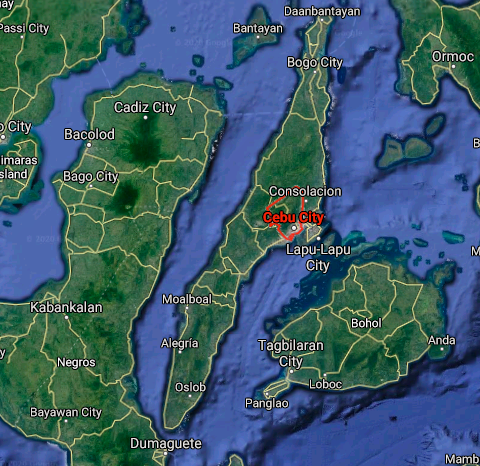Cebu City, NCR must ‘continue significant restrictions’ – experts
Forecast: Cebu City's COVID-19 cases to reach 2,485 with 29 deaths by June 15

Satellite map of Cebu City | via Google Maps
CEBU CITY, Philippines — The national government must ‘continue significant restrictions’ in areas high-risk of the coronavirus disease 2019 (COVID-19) outbreak such as Cebu City.
This was just one of the recommendations from experts of the University of the Philippines (UP) in their recent report titled ‘COVID-19 FORECASTS IN THE PHILIPPINES: Post-ECQ Report’ dated last May 20, and released to the public on May 22.
It is the seventh forecast report from UP’s team of scientists on the COVID-19 situation in the country and was completed a few days after the Malacañang decided to extend enhanced community quarantine (ECQ) for Cebu City.
The group is composed of Guido David, Ranjit Singh Rye, Ma Patricio Agbulos, and with contributions from Erwin Alampay, Emmanuel Lallana, Rodrigo Angelo Ong, Elmer Soriano, and Benjamin Vallejo Jr.
In the report, scientists stated that Cebu City, together with the National Capital Region (NCR), remained ‘high-risk areas’.
“For NCR and Cebu City, the number of new COVID-19 cases is still very high, and (its average reproduction number is greater than one) so the risk level of the pandemic is still high. In short, the transmission of the virus in the country is not yet controlled,” researchers said in their 15-page report.
READ MORE: Cebu COVID-19 cases near the level of hard-hit Metro Manila cities
Based on available data from April 26 to May 16, experts also projected that the total number of COVID-19 cases in the city, the capital of Cebu province where over 1 million individuals reside, can reach up to 2,485 with 29 deaths by June 15.
The Inter-Agency Task Force for Management on Emerging Infectious Disease (IATF – MEID) on May 16 heeded to the request of Cebu City government to have its ECQ extended up to May 31.
READ MORE: Mandaue, Cebu City remain under ECQ – IATF
As of May 22, the Department of Health in Central Visayas (DOH – 7) recorded a total of 1,919 confirmed COVID-19 cases in the city with 85 recoveries and 22 deaths.
Cebu City has been under ECQ for almost two months.
Risk-level
In determining a region’s risk level, it was disclosed in the report that the average reproduction number of COVID-19 cases, labelled as R, and the number of new daily cases per million of the population were calculated.
“A province or local government unit (LGU) is considered to be ‘high risk’ if R is greater than one, and the number of new COVID-19 cases per day is greater than 1 per million of population… NCR, Cebu City, and Zamboanga City are currently considered high risk.” they added.
Despite acknowledging and observing a decrease in Cebu City’s new COVID-19 cases reported per day from April 26 to May 16, experts said the ‘raw numbers’ in the city should still be a concern.
“Cebu City still sees many new COVID-19 cases, although the trend has decreased as of the most current week,” the report said.
“This is a positive sign and shows the trend for new COVID-19 cases is decreasing. However, the raw numbers are still very high, and Cebu City needs to reduce the number of new COVID-19 cases even further,” it added.
Other recommendations
Experts from UP also recommended for the government to commission studies on people’s mobilities in areas under quarantine as their fate whether or not to transition to ECQ, modified ECQ (MECQ), and general community quarantine (GCQ) loomed.
“These studies, using mobile (location) data and drilling down to the barangay level, could provide scientific evidence on what has changed when we moved from ECQ to GCQ or MECQ. They can then inform a more refined risk analysis — which is vital to evidence-based policymaking,” the document stated.
LGUs were likewise advised to be provided with mechanisms in case COVID-19 threats lead the government to place them under ECQ again.
Researchers also renewed their previous suggestions to ramp up COVID-19 testing capacities ‘as the country moves towards opening certain sectors of the economy’.
“We recommend that the first priority is the testing of people in the workforce in the economic sectors initially reopened followed by testing in other sectors as the national economy is gradually reopened,” the report added.
For Cebu, the IATF-MEID is eyeing to increase its testing capacity to 10,000 within the next two months. /dbs
READ MORE: IATF’s plans: 10K COVID tests in Cebu’s labs in a day
Disclaimer: The comments uploaded on this site do not necessarily represent or reflect the views of management and owner of Cebudailynews. We reserve the right to exclude comments that we deem to be inconsistent with our editorial standards.
